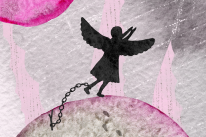
“Growth begins when we begin to accept our weaknesses.” ~Jean Vanier
I went out with my mom this Sunday, a beautiful, sunny, fall day in San Francisco. As we sat on a bench looking out over the bay and ate our vegetarian spring rolls, she reminded me of an incident that happened when I was a teenager when she and I had traveled to the Grand Canyon.
In a nutshell, I had gotten irate over a family that was feeding the ground squirrels French fries right next to a sign that said “Don’t Feed the Squirrels.” I went up to them and, apparently, was very vehement in my request that they stop feeding the F&*$% squirrels their F&*%$ junk food.
My mom laughed as she recounted the story (and how she now tells it to others), but I froze up in shame.
I remember how badly I felt afterwards for losing my cool like that—how I felt like shrinking up and disappearing. What to my mom was a funny story of a teenage freak-out, to me was yet another reminder of how flawed I am.
The story reminded me of hundreds of other times—some as recent as a couple of weeks ago—when I lost my temper and lost control. And how each time, I’ve felt the cold fingers of shame, guilt, and regret, and wonder despairingly what is so wrong with me that I can’t seem to stop blowing up at people.
I’m lucky enough to be surrounded by people who forgive me my faults and flaws as I forgive theirs. I can never hold a grudge for very long because I know how it feels to make mistakes.
Always, when I’ve lost it with someone, I’ve apologized profusely, and I’ve used these incidents as opportunities to look inside myself and explore what happened, what triggered my anger, and how I can help make it less likely to happen in the future.
But the truth is something that I can’t change: I have a temper, and sometimes it flares.
We all have flaws, weaknesses, and quirks. Even when we work on the things we can work on, we’ll still be human, and still make mistakes. I’m working on accepting myself as I am, including the part of that gets angry and sometimes loses control of that anger.
When I think about all the mistakes I’ve made in that regard, and especially when I feel myself starting to get lost in the shame and regret, I remind myself that if that me that I’m ashamed of were a friend of mine, I’d be able to forgive her.
I’d also be able to look on her flaws with compassion and understanding. I’d understand that she still has some work to do on her anger issues, and that she’s doing the best she can.
In those moments, I remind myself that if I can feel that kind of compassion for someone else, I can feel it for myself.
When we mess up, screw up, fall flat on our faces, make mistakes, and, in our own minds, fail, can we look at those incidents as just more opportunities to learn about ourselves and what makes us tick? Each time I get upset, I learn more about the nuances of why it happens, and the telltale signs that I’m about to blow up. Each time it happens, even though I still regret the pain I’ve caused others, I get better at knowing myself.
Good parents let their kids fall down from time to time. It teaches the kids how to soothe themselves, as well as where their limits are. It makes stronger, more confident, and more courageous kids.
Can we treat our own selves this way, picking ourselves up gently when we fall, and not berating and punishing ourselves for being human?
Here are a few tips for learning to accept our own weaknesses:
1. When faced with some part of yourself that you dislike, try to encompass that part in one non-blaming word or short phrase. Mine might be “I get mad.” Someone else’s might be “I can be judgmental” or “I eat too much when I’m sad.”
2. Consider the phrase and ask yourself: “If someone you loved had this flaw, what would you say to him or her?”
3. When you have an answer to that, turn it around and address it to yourself.
4. When you’re in the throes of self-hate, regret, or shame, do a Buddhist tonglen exercise: breathe in the pain of every other creature who struggles with that same problem, and breathe out healing and love, for all of you. This can remind you that you are not the only one who is imperfect.
5. When you can, cultivate the ability to laugh at your human foibles.
Photo by baileyraeweaver
About Melissa Kirk
Melissa Kirk is an editor, writer, and blogger living in the SF bay area and attempting to go with the flow and roll with the punches as much as possible. She writes for Psychology Today and also has a personal blog.













 Though I run this site, it is not mine. It's ours. It's not about me. It's about us. Your stories and your wisdom are just as meaningful as mine.
Though I run this site, it is not mine. It's ours. It's not about me. It's about us. Your stories and your wisdom are just as meaningful as mine.
did i write this or did you write this, OMG that is just me! Only thing is I dont seem to have gotten much of a grip on it as you have. That is, I still dont see the signs, or cant run away before i erupt. And its just for a moment. I calm down & feel total remorse immediately. But when i lose it i just lose it. Some people who are good friends will always forgive you. Very few can even make me laugh in the middle of it (one by saying “Thar she blows” ina funny voice each time – andits stuck in my head – i hear it sometimes even when he’s not around). maybe thats it. like the joni mithcel song: only with your laughter can you win ….
i still feel so much remorse and guilt for the people i have hurt / lost or just saddened over the years. and most of them are people i love …
my dad’s like that too. so its probably genetic! helps though sometimes, because he#s like a mirror and i can see what i must look like to others …
but i CANNOT control it. or any of my other violent emotions! they sneak up and grab me like a tsunami before i can control them!
maybe you can do a post on how you work on yours? in a more for dummies step by step way
Melissa: I, too, have had to deal with anger much of my life, very costly for me. Then I discovered an interesting view which altered my perceptions on the subject: When we are angry, at the core of it is anger towards ourselves! It made finding the source of the upset much quicker and I *had* to do self forgiveness.
On another note, you spend a lot of time talking about being “flawed”. You are not. You’re trying to measure yourself against some unknown and unstated yard stick. And that yard stick says that you’re not “perfect”, whatever that word means in this context.
In 1987, this was channeled to me:
“Your are as perfect- in this moment – as it is possible for you to be – in this moment. You cannot be next Tuesday’s perfect today. Thus, you are ALWAYS perfect NOW!”
It changed my life.
Thanks for your delicious post.
Love, Eric
I don’t agree that the problem is entirely in our inner ‘us’. My story is a completely different one. I have always had a great number of people around me without paying much attention to whom I can trust or not. In my view, these were more or less, superficial relationships. I was indifferent, too busy with my personal goals but at the same time I needed to socialise and tried to be there for everyone. These were not feelings, I felt it as a moral obligation. Later on, I realised that my attitude made them believe that I am a loving and affectionate person but it was too late. They organised a kind of contest ‘who I can tolerate most’ as no one knew me really well. At first, I was ashamed, I struggled wondering why they behave in a different way but slowly I managed to overcome this by reducing the number of my artificial relationships. I don’t have any regrets. But it was a hard lesson to learn. The moral of my story is that it is not always a good sign to give too much credit to people you barely know because they might misuse it.
Beautifully put. Thank you for that.
thank you for sharing…I know you help many by being here…:)
[…] by Melissa Kirk/TinyBuddha […]
[…] writing my last post for Tiny Buddha, 5 Steps to Accept your Weaknesses, I had an intense few days involving an extremely spiritually and emotionally significant […]
[…] when we acknowledgement our weaknesses there’s an implied sense of judgment, as if we should never make any mistakes. The alternative is […]
As the years go by, I have begun to accept my weaknesses and surely recognise them.
Unfortunately, though, the word “failure” still leads to a long pause for reflection; I am yet to be able to accept the risk of failure. This is taking some time to sort out.
[…] is always a way through our weak spots by connecting personal energy with the continual swirling movement of collective success and […]
[…] is always a way through our weak spots by connecting personal energy with the continual swirling movement of […]
This makes a lot of sense I identify with these words as I am chronically hard on others and myself most of all. When I first started reading I thought to myself, “here’s a case of denial if I ever saw one.” Then as I read on I realized I could have wrote it myself. It takes courage and patience to dissect one’s own sense of shame and remorse for various actions and reactions, to take the time to see where thoughts and behaviors come from and to try to do that without blame or judgment so we can grow instead of soaking in self-loathing. it makes sense to look at our faults outside our heads and pick ourselves up and start a new moment a better person for taking a moment to understand rather than judge. I’m the sort upon first inspection who appears outgoing and friendly, but underneath lurking near the surface is a sometimes mean-spirited cynic who’s hard on herself and those around her. This is not one of the items in my personal inventory that I like. From reading your post I gained some insight into myself and my funks that are there to act on when I allow myself to go down that road. I have been working daily on the inside “me.” I’m finding a little time and honest effort goes a long way in learning how to live, how to work and play well with others. Thank you for sharing your thoughts.
Sal
No one is really perfect and indeed, we all have flaws and weaknesses. Anger is a normal response but this should not take over us. I guess the best thing to do is to grow up, learn from such mistakes and work on making yourself better each day. Thank you for sharing these insights of yours. I hope that readers will much from this.
When you yelled at the people to not feed the squirrels, that was a sign of strength not weakness!!!
Thank you for this. I needed to read it today.
Thanks for this article, many people can benefit from this. I’m not trying to be difficult or controversial but what would you say to pedophiles? How can you love a part of yourself if it is that dark?